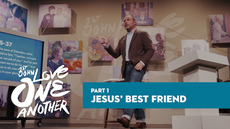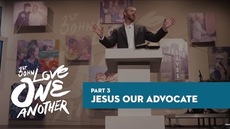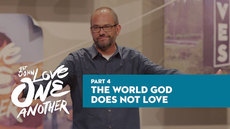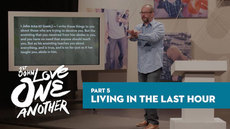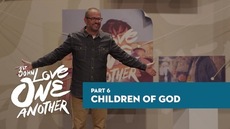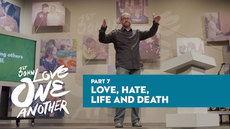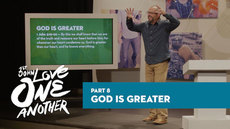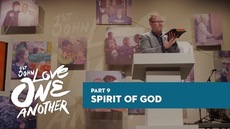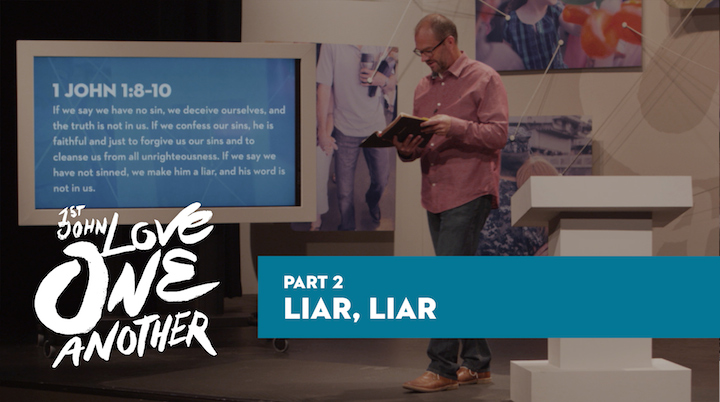
Can’t see the video? Download and install Flash to be able to view. Get Flash Here
This week’s message, “Liar, Liar,” is the second installment in our new series, 1 John: Love One Another. As we consider 1 John 1:5-10 we consider questions like, what does it mean that God is light? What does it mean to walk in the light? And in answering these questions, how do we live out a response of truth rather than lies? Pastor Dave Bruskas leads us through these questions and more in this week’s sermon.
5 This is the message we have heard from him and proclaim to you, that God is light, and in him is no darkness at all. 6 If we say we have fellowship with him while we walk in darkness, we lie and do not practice the truth. 7 But if we walk in the light, as he is in the light, we have fellowship with one another, and the blood of Jesus his Son cleanses us from all sin. 8 If we say we have no sin, we deceive ourselves, and the truth is not in us. 9 If we confess our sins, he is faithful and just to forgive us our sins and to cleanse us from all unrighteousness. 10 If we say we have not sinned, we make him a liar, and his word is not in us.
The Holy Bible, English Standard Version copyright © 2001 by Crossway Bibles, a publishing ministry of Good News Publishers. Used by permission. All rights reserved. Quotation information.
Welcome to Mars Hill church. Jesus is using Mars Hill to make disciples and plant churches all over the world and this wouldn’t be happening without your help.
Your gifts enable what you’re watching right now and help plant churches, equip evangelists, and translate resources and study materials for people who have never had access to them before. Whether you’re a part of a local Mars Hill church or you’re one of hundreds of thousands of people listening and watching sermons each and every week, you’re a part of our global family and I want to thank you.
I encourage you to pray about giving to Mars Hill. You make this content available for free to anyone in the world, send out more pastors, plant more churches, and bring the kingdom of Jesus Christ to our world today. Thank you.
Hi, I’m Bill Stroeing.
And I’m Carla Stroeing.
And we attend and serve at Mars Hill Shoreline.
I moved out here to Seattle in 1988, and after working construction, I wanted to change careers and I ended up going into—going to school to become a court reporter, and that’s where I met my wife. Right now we’ve been married 18 years together.
We had such a tight knit Community Group that we all— we all got to know each other really well, and so you felt comfortable around everybody, even you know, confessing sins and not feeling like you would be judged for your sins, for admitting that you had them. To where we had went to other churches where it’s like, God forbid anyone have sin, you know? Everyone had it but you couldn’t talk about it. So to finally be in a place with people that you felt comfortable with and that you were able to confess your sins.
I mean, that’s what Jesus died for, our sins, and we should be able to talk about our sins. We should be able, as a community, to come together, to know that we’re sinners, and to be able to bring those things out as we walk through life together, because that’s what Jesus died for.
He died for us sinners, and yet we’re so afraid to let ourselves known for what we really are and what we hide, sometimes real, real dark secrets.
I got my wife pregnant prior to marriage, and being in a religious community that I was in, I was really embarrassed to even—as a religious person, you don’t want to even let that out. And so we ended up having an abortion because of that, and it just grieves me. It grieves me so much to think about that.
Mark was talking about John the Baptist. He was preaching on John the Baptist, how God named John the Baptist from the womb, called him from the womb, and it’s like it just hit me. I cried during the service, went home, and we talked that night, and it’s like, “We need to confess this. We need to get it out.” We didn’t even talk to each other about it, 10 years. You know, we went to an old church that you couldn’t confess it, couldn’t talk about it, couldn’t tell anybody that we did it. We didn’t even talk about it to anyone.
The nice thing is is that no one in the Community Group judged us for it. No one—you know, they prayed with us, loved us through it, and we were able to get it out, and now we can talk about it. You know, I even was in counseling and community classes and stuff, and just being able to share that, you know, being able to talk about it now. I can talk about it openly, and even though sometimes I get teary, it’s like it’s something now that is okay to talk about.
Living life together is really an important part of Christianity. I believe it’s the outward righteousness that Jesus is looking for in our lives, you know, to love one another.
If we look at the Ten Commandments and we look at those, if we were to fulfill that, we would love God and love our fellow man. Outward righteousness that I believe Jesus is looking for is loving one another. It’s about as simple as it gets. If we’re failing in that area, I believe we’re failing in the righteousness that God wants to work out within our own hearts and lives.
Everyone here today, in fact, everyone everywhere, has at least one thing in common. We all have rebelled against God.
The Bible uses the word “sin” to describe us. All of us have sinned, but what separates us is our honesty about our sin. Are you truthful today about your sin or are you lying about your sin? The difference has everything to do with Jesus.
I want to invite you to open up your Bibles to 1 John 1. It’s almost the very end of your Bible. And we’re going to talk a lot about Jesus today.
Let’s pray. Father, you are a good Father to us. You love us with all the love that you have for your Son Jesus. And Father, that’s hard to get our heads around, much less get our hearts around, but we want to make progress in understanding how much you love us today. Jesus, you being eternally God, you being God the Son, the second member of the Trinity, you humbled yourself and you became a man, and you lived the only perfect life that’s ever been lived on the face of the earth. And you went to the cross, and there on the cross you took the penalty for our rebellion, for our sin, and you died. But the grave couldn’t hold you, Jesus. You were risen, and you’re at the right hand of the Father, and we want to worship you today. Father and Son, thank you for the Holy Spirit. Holy Spirit, help us, embolden us, empower us to be honest about our sin. Holy Spirit, help us understand today that Jesus wants us to see our sin, not to shame us, not to hurt us, but to help us, but to free us that we might live a life of worship to him. Holy Spirit, I especially pray for those that are here today who don’t yet know Jesus. I pray that not only would they meet Jesus, but they would be baptized right here today. All this we ask in Jesus’ good name, amen.
Turn if you will to 1 John 1. We’re going to pick up right where Pastor Mark left off last week in verse 5, and you’re going to see that Jesus is perfectly sinless and he exposes sin.
1 John 1:5, really important verse. It’s going to be the basis of a lot of the rest of our study in this book. “This is the message we have heard from him and proclaim to you,” him being Jesus, “that God is light, and in him is no darkness at all.”
That’s a powerful statement. Oftentimes, Scripture uses contrast to help us understand what distinguishes God from us. And one of the most common metaphors and common images in Scripture is that God is light and we’re in darkness. But as John is making his point here as inspired by the Holy Spirit, he’s saying this about God. God is light, and God is perfectly light, and that there’s no darkness in him.
Jesus says it this way, John 8:12, the very words of Jesus. "Again Jesus spoke to them, saying, “‘I am the light of the world. Whoever follows me will not walk in darkness, but will have the light of life.’”
That’s a profound statement. There’s a contrast between who we are and who God is. God is light, God is perfectly light. There’s no darkness in him. We are in darkness.
What does that mean though? This contrast can mean a few things. One would be that’s God is omniscient so he’s light. He knows all. He’s truth. He’s reality and we’re ignorant. We’re deceived. We’re in darkness. He’s in light, we’re in darkness. It can mean that God is life, that he’s the light of life as Jesus says here, and we’re in darkness, which means we’re in death. We’re spiritually dead.
But I believe what you’re going to see in this passage in 1 John is a very specific meaning of what God means when he says he is light, that he’s perfectly sinless. He’s absolutely sinless. The Bible uses the word “holy.” God is holy, we’re unholy. God is sinless, we are sinful. God is perfect, we’re imperfect. God is righteous, we’re unrighteous.
And Jesus is perfectly sinless, and not only is his light untainted, without shadow, perfectly radiant, but it exposes darkness. This light is so powerful, this light that is God, that the darkness doesn’t challenge the light, but instead the light exposes the darkness. Do you know Jesus in that way today?
I didn’t grow up in a Christian home. My mom met Jesus when I was a preteen, and she decided to drag me and my little brother to church, and it was quite honestly a very painful experience. And so if you have that experience at church today, I can sympathize with you. I didn’t like it, I didn’t want to be there, but I had to go because my mom made me. And then my dad became a Christian and my fate was sealed. I couldn’t get out of church any longer.
And I remember going, and I just didn’t understand Christianity. To me, Christianity was very simple. It was about certain things you were supposed to do, and certain things you weren’t supposed to do, and if you did enough of the good things and avoided the bad things, at the end of the day, you would score out all right.
And as I opened up a Bible, I began to be compelled to understand this character, Jesus. And the more I understood about Jesus, the more I realized he made some radical claims. And I began to understand Christianity through the person and work of Jesus, and everything culminated for me—
I was 13, so you can do the math. You can figure out how old I am. It was March of 1979 as a 13 year old, so I’m 29 now.
And March 1979, I gave my life to Jesus. As I came to know Jesus, I saw him as a light. He was perfectly sinless, I was sinful. He was pure, I was impure. And he went to work right away in my life.
And things that I used to think in my life were okay were not okay anymore, particularly in my relationships. Things that I used to think with my brother were merely competitive, “I’m just being competitive with my brother,” Jesus said, “No, you’re being cruel. You’re crushing your brother, you’re not competing with your brother.”
And suddenly, I began to be aware of following Jesus as he is light meant that there was no darkness in him, and part of his role in my life was to shine his radiant, perfect light into my darkness and expose my sin.
Do you know Jesus that way? Because if you don’t know that Jesus, you probably don’t know the real Jesus today.
Now two lies, two lies that we can have, and believe, and be deceived about sin in our lives as Christians that I want to show to you now.
You need to understand the context of 1 John. 1 John, by Bible scholars, is considered a circular letter, meaning it went to many different churches.
And here’s what was going on in the early church. There were people that were part of the early church in the early days that began to teach things that weren’t biblically true. They began to teach things we would call heretical, and they left the church, and as they left the church in heresy, they relied on old relationships to bring people out of the church.
And so there were lies that were being taught, particularly about who Jesus was and what sin is, and John wants to address and confront those lies.
Look at verse 6. Here’s the first lie that you and I can believe. It’s simply this, that I follow Jesus and I’m a practicing sinner. 1 John 1:6, “If we say,” and I want you to circle that phrase. It’s going to appear three times today in our text. It’s an important argument. “If we say we have fellowship with him,” him being Jesus, “while we walk in darkness, we lie and do not practice the truth.”
When the Bible uses the word “walk,” it means that you live predominantly. So what this person is suggesting, how this person is deceiving himself, and what this person is actually saying is, “I follow Jesus, but I’m a practicing sinner. I follow Jesus, but the overwhelming majority of my life is spent in sin. I follow Jesus and I accept that he’s the light, he’s the perfectly sinless one who exposes sin, but I persist in sin. I practice sin. Sin is something that I still remain enslaved to and my predominant disposition isn’t obedience to Jesus, but it’s defined by sin.”
Do you see the err in this way of thinking? There’s a subtle hint in this statement that, “You know what? I can hide my sin from Jesus. Oh yeah, I follow him and I accept the fact that he’s light, he’s perfectly sinless, he exposes sin, but I have this private, hidden, concealed life over here that he can’t see, that he can’t invade, that his light can’t expose, and it’s darkness.”
Two years ago I got a phone call early in the morning from a wife of a very close friend of mine. When you’re a pastor and you get phone calls early in the morning, it’s usually a bad thing. That’s true of everybody I suppose. It’s usually not a good thing. And I could tell by her voice on the other end that she was frantic. And the first thing I wanted to know is, is my friend all right? He’s been a lifelong friend. I’ve known him for years, and years, and years. Is he okay? Is he in the hospital? And surprisingly she said, “No he’s not, but I wish he were.” And I thought, “Okay, this is going to be worse than I even thought.” She said, “I want you to know this about your friend,” and she was very angry. She said, “Your friend, my husband, has been living a private life now for 25 years.” She had caught him living a private life in which he was completely addicted to pornography. So much so that when she finally confronted him and he told her everything, it became evident that he had racked up over $70,000 in debt through a pornography addiction.
You ever had that experience with someone you love and your first thought is, “Do I even know you?” That wasn’t my first thought because knowing this man very well and his profession that he was a follower of Jesus, my first thought was, “Can you possibly know Jesus?” How can you know Jesus and be a practicing sinner? How can you know Jesus, and Jesus being the light that shines in the darkness, that shines in the darkest recesses of our life, and exposes sin, not to shame us but to deal with our sin and free us, how could this man know Jesus?
Maybe this is a lie you’re telling yourself today. Maybe you’re misguided in thinking that somehow there’s dark recesses in your heart, in your life, that Jesus can’t reach, that Jesus can’t see, that your darkness is too great for Jesus. But you need to understand the power of the light of Jesus. Your darkness doesn’t eclipse the light of Jesus. Your darkness doesn’t obscure the light of Jesus. Instead, the light of Jesus shines into your darkness. And Jesus wants to expose your private sin, not to condemn you but to free you.
Some of you are living this lie today. Truth be told, your life is more defined by sin and disobedience rather than obedience and worship of Jesus. And instead of growing as a follower of Jesus, instead of growing in obedience, you’re continuing in patterns of sin.
There’s good news for you today, friend. Look at the next verse. Here’s the solution right here. 1 John 1:7, “But.” That’s a great word. “But if we walk in the light, as he is in the light, we have fellowship with one another, and the blood of Jesus his Son cleanses us from all sin.”
Isn’t that good news? We don’t have to be practicing sinners. All we need to do is walk in the light. All we need to do is be transparent and open before God and each other, and deal with our sin honestly, and truthfully, and candidly. And if we do, and if we walk instead of in the darkness and walk in the light, here’s a beautiful promise. The blood of Jesus, his perfect work on our behalf on the cross, is sufficient enough to forgive us, and cleanse us, and change us. And we will, if we walk in the light, we’ll have fellowship with one another. Specifically, we will have fellowship with Jesus. Do you believe that? Does your life demonstrate that truth?
An update on my friend. He came clean 2 years ago with his wife, and with his friends, and most importantly with Jesus. And the last 2 years have not been perfect; they’ve been difficult. He’s been working hard to put his marriage back together. He’s been working hard to have a good relationship with his adult children who knew what he’s done. But here’s what I’ve seen. He’s got a sweet relationship with Jesus right now. He’s experienced the full forgiveness of Jesus. He even met with a counselor recently, and this counselor told him that a pornography addiction like that just doesn’t go away over night, that it’s going to take years, and years, and years for him to experience true transformation. And the truth of the matter is, in the 2 years since he came clean, he hasn’t looked at pornography at all. He’s a broken person and his life isn’t perfect in any way, but he’s experiencing firsthand the freedom that Jesus gives when we walk in the light with our sin.
Are you lying to yourself today? If I were to look at your life and I were to see all the way that Jesus sees all, would I conclude that you’re a practicing sinner who occasionally obeys Jesus, or instead are you one who walks in obedience, walks in the light, and occasionally sins, and when you sin, you bring that to Jesus and let him deal with it?
Here’s the second lie we can fall in, 1 John 1:8.
First lie is, “I’m a follower of Jesus and I’m a practicing sinner.” The second lie is the antithesis of that. The second lie basically states, “I am a follower of Jesus and I’m perfectly sinless.”
1 John 1:8, “If we say we have no sin, we deceive ourselves, and the truth is not in us.” That’s a big statement. The idea of having no sin goes beyond even saying, “I don’t do wrong things.” It’s literally saying, “The presence of sin is entirely eradicated from my life. There’s no sin anymore.”
Here’s what the Bible teaches us about what it means to be a new person in Jesus. The Bible makes it very clear that when we come to faith in Jesus, we’re regenerated. We’re not new and improved, we’re made entirely new altogether. We have this new identity in Jesus. And the power of sin that enslaves those who don’t know Jesus is destroyed, so sin doesn’t have power over us like it used to, that we have to be slaves to sin. Yet the Bible makes it very clear that the presence of sin still lives in us. We’re not to be slaves to sin, but sin still stays with us and the potential of sin is with us always, until either we die and we go to be with Jesus or Jesus returns and in an instant translates us into people who think, feel, speak, and act like Jesus.
But until that day, sin lies dormant in your heart, ready to be activated in a moment. So to say, “I have no sin,” is a lie, and it’s deceptive, and it’s ultimately dangerous because you can drop your guard, and you can be deceived into thinking you’re something you’re not, and you can step away from being vigilant in your fight against sin through Jesus.
Have you had that happen before? Have you had sin in your life that you thought you put to death, you thought you were past, you thought you’d moved on, and then all of a sudden in a weak moment, it sprung up again and there you were?
This happened to me recently. We had just come back from vacation in Colorado as a family, and thank you for being so generous and allowing us to have vacation. We had a great time together as a family, or so I thought. And we were sitting around the dinner table and three of my four daughters were home for the summer, and we began to talk. And at the end of dinner most nights, we have a time where we just talk about, “What are you learning in the Bible?” And so everyone went around the table until it came to one of my daughters, and I won’t reveal her identity, and she said, “Dad, when are we going to address the elephant in the room?” It’s always a bad thing to hear from somebody at the table because I didn’t see an elephant. I said, “I don’t know what you’re talking about. Help me understand.” She said, “Why don’t we talk about how uncomfortable vacation was?” I said, “Okay. Was it the accommodations? Was it the weather? Was it the activity?” She said, “No Dad, it was you.” Ouch. “Really, what was I doing?” She said, “Dad, you were intense. You had a lot of conflict with us, and you weren’t being kind, and you were being edgy, and it just made the whole thing awkward.”
One of the things I’ve been working hard on my whole life as Jesus has brought into light is the propensity that I have to be defensive when I’m confronted. You like that at all? Instead of listening and trusting that whatever confrontation comes your way Jesus intends for your good, and being patient, and being humble, I like to put up walls, and I like to cut that off at the pass, and I don’t like to go there.
So I began to explain myself. “Well, you don’t understand.” And I began to justify—get this. I began to justify, “And your sister had it coming to her when I screamed at her across the mountainside that she wasn’t riding her mountain bike fast enough. She deserved that, and if you would just listen to me, you would be closer to Jesus.” Ouch.
Sin is dormant. Sin persists in all of our hearts, right? And sadly, it will remain there until the day that Jesus translates us into who he ultimately wants us to be. But until then, we have sin. You have sin. I have sin. And if anyone here says today, “I follow Jesus and I’m perfectly sinless. I’ve arrived. Sin, not a problem for me anymore,” you’re a liar.
More good news. You ready for good news?
Verse 9, what do we do about sin then? Glad you asked. Here’s the good news. Verse 9, “If we confess our sins,” not the presence of sin in our heart, but actual sins. “If we confess our sins, he is faithful and just to forgive us our sins and to cleanse us from all unrighteousness.” What a promise.
Let’s focus on Jesus. We’ll come back to confess our sins.
If we’re honest about our sin, if we confess our sin, if we bring our sin to Jesus, guess what? Not only is he the light in that he’s perfectly sinless and exposes sin, he also deals with our sin in freeing and forgiving ways. He’s faithful. Jesus made a promise to us that if we will trust in him, he will see us through in this whole project, in our fight against sin. That he will see us through all the way to the end that one day we will be a people exactly like him. And if we are honest about our sin and we bring our sin to Jesus, he’s faithful to his promises. He forgives us.
You know what that means? Most literally that means we don’t owe him anything. We don’t have to pay the debt for our sin because he’s already paid for it in full. We don’t do penance. Why? Because Jesus paid for it already, so he forgives us. I don’t have to go do ten things right to make up for the one thing I do wrong. It’s not like at home when if I forget to take out the trash, I’ve got to do the dishes 5 nights in a row. Just kidding, it’s not exactly like that. That’s how I’m programmed to think, though. If we confess our sins, he’s faithful, and just, and he’s forgiving. And not only does he forgive us and say, “You don’t owe me anything, I’ve taken care of it,” you know what else he does? He goes a step further. He cleanses us. That sin doesn’t stick to us like a grimy residue. He cleans us up and he cleans us off. And he sees us as robed in his perfect obedience, and his righteousness, and his light, and his holiness.
That’s good news. That’s good news for a man who continually is defensive when he tries not to be. That’s great news.
Now, let’s hone in on what the word “confess” means. It’s an important Bible word. In the original language, it’s a compound word, two words brought together. The first word is “same” and the second word is “speaking.”
So when we say we confess our sin, in essence what we’re saying is we say the same thing about our sin that God does. Make sense? If God says our sin is wrong, we look at our sin and say, “God, you’re right. You’re the umpire. You call strikes. You call balls. And if you’re saying this is sin, then I agree with you. God, if you say that this is sin and it grieves your heart, I agree with you. If you say this is sin, and it hurts others, and it hinders the fame of Jesus, then God, I agree with you. Search my heart, God. You call it what it is, and when you call it out, I will absolutely agree with your conclusion.” That’s what confession is. It’s saying the same thing about your sin that God does.
See how significant it is that we understand that Jesus is the light of the world? He’s perfectly sinless and so much so that he gets to call out our sin and expose it, not to condemn us, but to free us.
Where are you disagreeing with God today about sin? Where are you sinning, and God is showing you that you’re sinning, and you’re refusing to agree with him? You’re trying to talk your way out of it.
Years ago, I found out a good trick, and I think it was just that, I think it was a trick, to help pastoral ministry be a little bit more effective. I began to take the bus to work and home. And as I took the bus in the morning, it gave me time before I stepped into the office to read, to pray. I actually enjoyed visiting with people on the bus. I think you meet the most interesting people in the world on the bus.
A side note, but I remember one day going into work and there was a mom, and she had four little kids, little teeny kids, just stairstep. And she has—she got on the bus from the grocery store and she had two or three bags in her arm, and her little kids each got in and each one of them had a bag. You know, even the one that could barely walk, you know, had a bag. And they sat down next to be and I was just so impressed by her and this bus ride that I looked her in the eye and I said, “Isn’t riding the bus great?” She looked at me and she said, “You know sir, it’s only great if you don’t have to ride the bus.” And I said, “Okay, I stand corrected.”
I took the bus to work, and then on the way home it allowed me to decompress. So I would be dropped off at the bus stop, then I would take a long walk home through a really nice park. And I remember it being sunset on a glorious fall afternoon, a little bit crisp, and I was walking through the park on my way home, decompressing, kind of caught up in the season. And as I was praying, I simply asked the Lord, “Lord, I don’t see like you see. I don’t see the dark recesses of my heart. Show me the things that are in my heart that I don’t see that I need to confess to you so that I can agree with what you say.”
I didn’t hear an audible voice, no specific Scriptures came to mind, but these two words surfaced in my thinking. The first word was idolatry, and the second word was adultery.
Now, the idolatry one was a little bit easy to agree with God on because here’s what I was doing during that time in my life. My aspiration then was to be a great preacher, and I was practicing—although I didn’t like to admit it, I was practicing relationship with God as a means to the end of being a better preacher.
So, my thought was this. If I can have a good relationship with God, then I can be a great preacher. Do you see how wrong that is? Do you see how that’s inside out and upside down. That doesn’t make sense. Anything we use God for for another end, that’s idolatry. God is the end in and of itself.
So immediately I said, "Lord, I agree. I see the idolatry. “From this day forward, Lord, I don’t want to have a good relationship with you so I can be a great preacher. Instead, I want to preach good so that I can have a great relationship with you. And I want preaching from here on out just to be an act of worship, nothing more, nothing less.”
But the adultery thing, that threw me off. And I remember thinking, “Lord, we need to talk about this because I think you missed that call. Lord, don’t you see what’s going on in my life? I’m emotionally faithful to my wife. I’m physically faithful to my wife. I’m not looking at images I shouldn’t be looking at. I’m not engaging in lustful thoughts. I don’t know what you’re thinking or what you’re saying, but you’re wrong. I can’t confess that. I won’t confess to something I’m not guilty of, Lord.”
And around this park, there was a track, a walking path, that was somewhere between a 1/4 mile and a 1/2 mile, and I decided, “I’m gonna walk around this thing until I figure this out. Lord, you and I are going to talk this out and we’re going to resolve this, and I’m not going to go home until this is resolved.”
Probably my third time around the track, I suddenly got what he was saying. I had an unhealthy, sinful desire in my heart to be admired by women. And what I was doing that the Lord saw that it took me a long time to see, what I was doing while I was preaching is I was holding myself up through every sermon illustration of being the perfect husband and the perfect dad. And it was if all the guys in the church came to me privately through the Lord and said, “Hey bro, would you stop doing that? You’re making the rest of us look really bad.”
And I remember that moment saying, “Lord, I don’t want to do that anymore. I want every married woman in the church, I want the man that she respects the most in the world to be her husband, so let me take that angle instead.”
Some of you are disagreeing with God today about sin in your life. The Lord is using Scriptures, he’s using other Christians to point out sin over, and over, and over again, and you refuse to agree with him. You’re not speaking the same thing about your sin that God is. Here’s what you’re missing out on. You’re missing out on the forgiveness and cleansing that could be yours in Jesus. Would you stop lying? Would you humble yourself and would you receive the gift of grace from God to you and Jesus that is confession? Would you agree with God and say, “God, you’re right. I confess it. Now please, God, do your thing. Jesus, would you forgive me? Jesus, would you cleanse me because you are faithful and just?”
The final lie we’re going to look at today is the big one. Ready for this? This one is really scary. Hold onto your seats. Here we go.
Verse 10, “If we say we have not sinned,” that’s a big statement, not sinned, “we make him a liar, and his word is not in us.” Ooh, now we’re doing more than self-deception. Now we’re guilty of blasphemy. If we say we’ve never sinned, we’re calling Jesus a liar. We are defiantly shaking our fist in the very face of God and saying, “Jesus didn’t need to die for my sin because I have no sin. I don’t need Jesus to be the light because my light is perfectly fine, thank you.”
If you’re not a Christian, this is exactly what you’re doing today. You’re calling God a liar. If you look at Jesus and Jesus is to you nothing other than a good teacher and a guy who went to the cross to give us a good example of how much we should love others and be willing to die for them, you missed the whole point. You don’t respect that Jesus. You are actually calling that Jesus a liar. And I know that Jesus well, and I want to respect your right to disagree with him, but I don’t really want to stand close to you while you continually call him a liar. Is that what you want someday? When you ultimately give an account of your life to God and you can say, “You know what? I did some good things. I cared for people. Yeah, I made some mistakes. And God, you’re a liar because I haven’t been honest about my sin through the person and the work of Jesus.” Yikes.
Some of you today need to not just confess your sin. You need to repent. Repent means you literally turn from your sin. You see what Jesus says about your sin. You see the ugliness of it. You see the way that you’ve rebelled against him and hurt him. And you turn from your sin, and you turn to Jesus, and you embrace him. And you say, “Jesus, I believe you are who you say you are. I believe you’re the solution to my sin. I not only believe that you’re just the light, you’re not just the one who exposes sin, but you’re also the one who forgives sin. You’re also the one who cleanses me from sin. Jesus, I turn from my sin and I trust in you.”
I want to stop and pray for you right now if you’re not a Christian. I want to invite you to turn from sin and I want to invite you to trust in Jesus.
Father, I pray for those that are here today that have, in essence through their life’s actions, perhaps even passively, called you a liar. Lord, I pray that they would turn from sin, I pray that they would trust in Jesus, and I pray that they would know that you’re a God who is gracious, and forgiving, and kind. In Jesus’ good name, amen.
If you just repented of sin for the first time today, guess what? We want to baptize you. I know you didn’t plan on that. It’s not what you had in mind when you came here, but we’ve prepared. And if you confessed your sin to Jesus for the first time today, in just a little while we want to baptize you.
I love the way that John presents Jesus here. I love the way that John presents God, even in his gospel. You get these two seemingly contrasting pictures of Jesus that we are to bring into balance. You don’t balance God, you experience the fullness of God.
Two statements that John is going to make about Jesus in this letter. The first one is this that we just studied today. He’s light. He’s perfectly sinless and he exposes sin. But you’re going to find in 1 John 4:8 a profound statement that most of you are already familiar with, and that is that God is love.
And sometimes, we have a difficult time of fully understanding the essence of God. God is holy. God is just. God will not be called a liar. God is light. But God is also faithful, and forgiving, and merciful, and compassion, and God is love. We need to have a full understanding of who God is for us in Jesus, don’t we?
Let me show you the risk that you run if you want to look at God in one dimension, right? Let’s look at these together.
First one is this. Believing only that God is light leads to perfectionism. If all you believe that God is is light, that he’s holy, and he exposes sin, and everything stops there, then you better live a perfect life, right? Then from your perspective, a relationship with God is all about duty with a propensity towards despair. Because what happens when you mess up, and you ultimately will?
I knew a man who sinned greatly against his children in abusing them, and he kept his secret from his wife for years. And one day, he came to me in a moment of courage and said, “Pastor, will you meet with my wife and my kids?” His kids were now adults. “Will you meet with us? Because I want to come clean with what I did.” And he shared, through tears, all that had happened. And he asked for forgiveness from his children, and from his wife, and it was a chaotic scene for a little while. Then it settled down, and his family graciously forgave him in that moment, and said they were committed to working out forgiveness for the rest of their lives.
Two weeks after that incident, I caught up with him again and I said, “How are you doing?” He said, “I’m not doing well.” I said, “Why are you not doing well?” He said, “Because I know that I can’t be forgiven of this.” I said, “Are you kidding me? Like, I want to assure you that Jesus forgives you.” He said, “Nope, nope.” He even quoted this verse. “God is light. There’s no darkness in him.” He said, “I know I can never be forgiven for what I’ve done to my family. All I can do for the rest of my life before I’m punished for all eternity is do the best I can.”
You see, if we don’t understand God’s attributes in their entirety, we go to strange places. God is light. He’s holy. He’s just. He’s righteous. He demands an account for sin. He exposes sin. But God is love. He’s faithful, and just, and forgiving, and cleansing.
The second place we can go wrong, believing only that God is love leads to permissiveness, right? If we don’t understand that God is fully light and God is fully love, or as John, this very same John, would say in his gospel, chapter 1 verse 14, about Jesus, “He was fully of,” not balanced. “He was full of grace,” that’s love, “truth,” that’s light. And all we think is that God is love is then we will become permissive about the sin that Jesus wishes to forgive and free us from, right?
You’ve been here before. You’ve confronted someone in their sin and they told you to back off because God is love.
Someone I loved died recently. His life was a very rough life. He was a drug user at a very early age, and through drug abuse contracted AIDS, and died years later from AIDS. And this man, I loved him very much and he was a part of the church, but he struggled his whole life through addiction. And what was interesting about his addiction, it really wasn’t to drugs. His addiction was really to—this is going to sound really strange, so just trust me—to female companionship. So he would so need a woman in his life that he would find women that usually, together, led them down the path of drug abuse. And there were many wives, and there were many girlfriends, and he fathered children all over the place.
And I remember one time inviting him to come to Redemption Group, right? Great ministry of the church. And he went to the first Redemption Group meeting, and he was leaving, and I caught him as he was leaving. I said, “Hey, this is going to be really good for you. Why don’t you stay?” He was like, “You know what? I don’t want to do this. This is too confrontational. I really don’t want to do this because, I’ll tell you what, God is love and I’m fine with that.”
God is light and he’s love. God is holy and he wants to expose the darkness in our life, not so that he can condemn us, not so that he can shame us because he’s also love. So that he can forgive us, and free us, and conform us into the image of Jesus.
Mars Hill Church, hear me out. This is what health looks like. Ready?
Believing both that God is light and God is love leads to progressively becoming more like Jesus. If we understand what John is saying here about God, that God is light and God is love, and he’s the fullness of both of those attributes, then we have hope. We don’t have to go to perfectionism. We don’t have to go to permissiveness. We can be honest about our sin and we can progressively become a people who day in and day out think, feel, speak, and act like Jesus.
Mars Hill Church, we need to be that type of people right now, don’t we?
I love you. I’m thankful to be with you. I’m thankful not just to be a pastor in this church, I’m grateful to be a member. But if we’re learning anything about ourselves right now, we have got to make progress. We have got to understand, as we look into the face of Jesus, that he is light and he is love. And we have sin that we have to deal with and be honest with. No more lying about sin.
And some of you, some of you are going to be at risk in this season of controversy and difficulty because you are going to take your eyes off of Jesus and you’re going to put hope in lesser objects.
Mars Hill Church, our hope isn’t in Pastor Mark and his preaching. Our hope is in Jesus. Mars Hill Church, our hope isn’t in any pastor or pastors, our hope is in Jesus. Mars Hill Church, our hope isn’t in polity, and polity amendments, and polity changes, out hope is in Jesus. Mars Hill Church, our hope isn’t that help is going to come to us in the form of other Christians outside this church, our hope is in Jesus. Do you see Jesus for who he is? Nothing is more important to us right here, right now than we have full understanding of Jesus and all of his glory, that he is light, and he is love, and we can be open and transparent about our sin with him. And as we do that together as a people, guess what happens? We progressively become more and more like him. Do you want that, Mars Hill? May we do that together?
I’m going to ask you to respond. We’re going to respond in different ways today and it may take different forms, but I want each of us to respond with confession. Allow Jesus to shine his light into the darkest recesses of your heart, would you? And would you say the same thing about what he sees there as he does? Would you consider that?
We’re going to sing. We’re going to take Communion together. Some of you are going to be baptized, and your lead pastor will come up and explain exactly how to do that today. So, I want to invite our financial stewards to come up and prepare to take the offering.
Let’s pray and let’s respond together today to Jesus being the light of the world by confessing our sin to him openly and honestly. Will you pray with me?
Jesus, thank you that you are the light. Shine your light into the darkest recesses of our hearts, of our church, of our life. We allow you and we invite you to do so because we know in so doing, you’re not condemning us, you’re wanting to conform us. You want to free us and forgive us that we might become worshippers as we were created to be. Jesus, I pray for those who just met you today. I pray that you would give them courage to be baptized. And I pray that you would lead us forward into a new future together, Jesus, as we affirm once again, you’re the senior pastor of this church. You’re the one who ultimately matters, and we want all of our life to be in alignment with who you are. For your glory and our good we ask these things in your good name, amen.
Pastor Sutton Turner here. The sermon just finished and you can still play a role at Mars Hill church. Whether you’re part of one of our local Mars Hill churches, or part of our global Mars Hill community, if you value this sermon, please consider making a donation by visiting marshill.com/give.
Sermons like this are recorded and streamed for free to anyone interested in learning more about Jesus and living their faith. And I’d like to ask you to support making that happen by making a gift, even a small one, to Mars Hill, you will help a global family of brothers and sisters in Christ that download sermons like this one over 10 million times.
Your gift also helps plant churches, equip evangelists, distribute bibles and study materials all over the world. Let’s see more materials translated, more pastors sent out, more churches planted, and more people saved by Jesus Christ.
